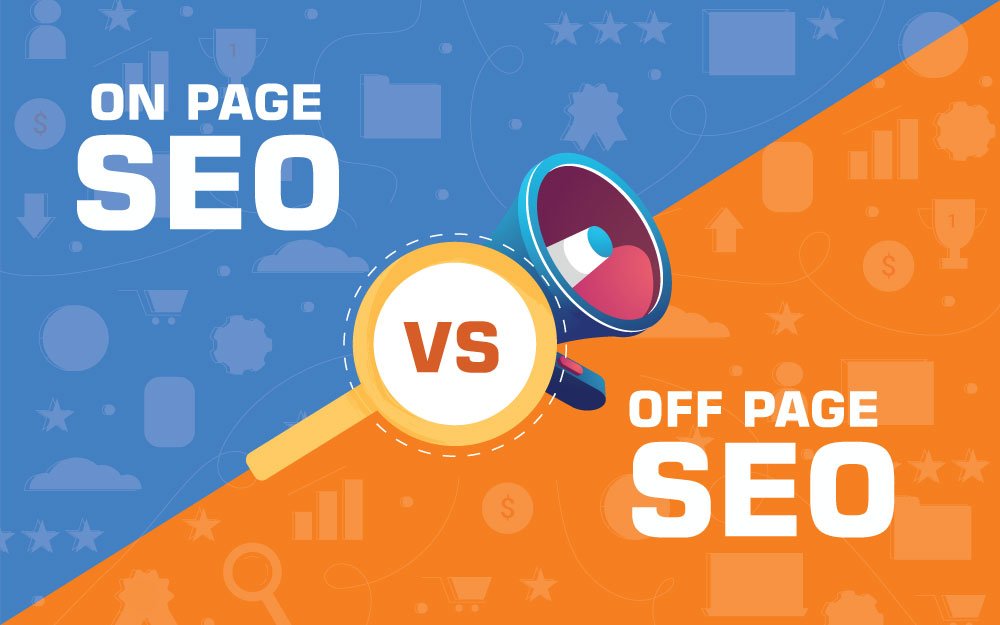Search engine optimization (SEO) is a multi-faceted approach that helps websites improve visibility and attract more organic traffic. Two main pillars support a successful SEO strategy: On-Page vs Off-Page SEO. This article explores the differences between these two strategies and why both are essential for a well-rounded SEO plan.
What is On-Page SEO?
On-page SEO, also known as on-site SEO, involves optimizing elements within your website to improve search engine rankings. These elements include content, HTML code, URL structure, and internal linking. By optimizing these components, you can make it easier for search engines to understand and rank your website.
Key Elements of On-Page SEO
- Keyword Optimization: Using relevant keywords in titles, headings, and throughout the content helps search engines understand your content’s main topics.
- Meta Tags: Meta titles and descriptions are HTML tags that briefly describe a page’s content. They are crucial for helping search engines and users understand your page’s relevance.
- High-Quality Content: Quality, informative content is vital for engaging users and improving rankings. Aim for content that addresses user intent and provides clear, valuable information.
- URL Structure: Short, descriptive URLs that include primary keywords can improve visibility and usability.
- Internal Linking: Linking to other pages within your site helps users and search engines navigate your content better and understand the structure of your site.
- Image Optimization: Alt tags, captions, and file names with keywords help search engines interpret image content, which can impact search visibility.
Effective on-page SEO makes your website more accessible to search engines and enhances the user experience, which can improve rankings and engagement.
What is Off-Page SEO?
Off-page SEO involves activities conducted outside your website to improve its credibility and authority in the eyes of search engines. This strategy largely focuses on building backlinks, social media marketing, and other ways of establishing your site’s reputation.
Key Elements of Off-Page SEO
- Backlink Building: Earning high-quality backlinks from authoritative sites signals to search engines that your site is reputable. Quality backlinks are one of the strongest ranking factors for Google and other search engines.
- Social Media Engagement: While social signals don’t directly impact rankings, a strong social presence can drive traffic, increase brand awareness, and potentially lead to more backlinks.
- Guest Blogging: Writing guest posts for reputable sites can provide backlinks and introduce your brand to a wider audience, increasing credibility and authority.
- Influencer Marketing: Partnering with industry influencers can expand your reach, drive traffic, and increase the likelihood of earning quality backlinks.
- Brand Mentions: Even without a link, brand mentions on trusted sites can contribute to your site’s authority and signal relevance to search engines.
Off-page SEO is essential for building trust with search engines. When reputable sites link to your content, it serves as an endorsement of your website’s authority.
On-Page vs. Off-Page SEO: Key Differences
While on-page and off-page SEO both aim to improve rankings and drive traffic, they differ in focus and implementation. Here are the main differences:
| On-Page SEO | Off-Page SEO |
|---|---|
| Focuses on internal elements of your website, such as content, HTML code, and structure. | Focuses on external factors, like backlinks, social signals, and brand reputation. |
| Directly impacts the user experience and how search engines understand your website. | Indirectly influences rankings by establishing trust and authority through external endorsements. |
| Examples include keyword optimization, meta tags, URL structure, and internal linking. | Examples include link building, guest blogging, and social media engagement. |
In summary, on-page SEO is about optimizing your site for search engines and users, while off-page SEO is about building authority and credibility through external efforts.
Why Both On-Page vs Off-Page SEO Are Essential
A successful SEO strategy requires a balance between on-page and off-page optimization. Here’s why both are important:
On-Page SEO: Building a Strong Foundation
On-page SEO ensures that your website’s structure and content are optimized, creating a solid foundation that improves crawlability, user experience, and relevance. Without proper on-page SEO, even the best off-page strategies will struggle to yield significant results because search engines won’t understand your site’s content.
Off-Page SEO: Establishing Authority
Off-page SEO, particularly through backlinks, signals to search engines that other reputable sites trust and endorse your content. A website with high-quality backlinks and a strong social presence is more likely to be viewed as authoritative, increasing its chances of ranking higher in search results.
Combining both strategies maximizes your site’s visibility, helping it rank higher and attract more organic traffic.
How to Create a Balanced SEO Strategy
To get the best results, integrate both on-page and off-page tactics into your SEO plan. Here’s a step-by-step guide to help you create a balanced approach:
- Conduct Keyword Research: Identify relevant keywords for your niche and use them to guide your on-page optimization and content strategy.
- Optimize On-Page Elements: Ensure that all on-page elements, including meta tags, content, internal links, and images, are fully optimized.
- Focus on High-Quality Content: Produce valuable, original content that addresses user intent and encourages sharing and backlinking.
- Build Quality Backlinks: Reach out to reputable sites in your industry for link-building opportunities through guest posts, partnerships, or influencer collaborations.
- Engage on Social Media: Share content on social platforms to expand your reach and foster community engagement, which can lead to more organic backlinks.
- Monitor and Adjust: Regularly analyze SEO performance data to understand which tactics work best and adjust your strategy as needed.
By following these steps, you can achieve a balanced SEO strategy that leverages the strengths of both on-page and off-page SEO.
Conclusion
Understanding the differences between on-page and off-page SEO is essential for any business looking to improve its online presence. On-page SEO lays the foundation for a well-structured, user-friendly site, while off-page SEO builds authority and trust through external signals. By integrating both strategies, you’ll be in a stronger position to rank higher, attract more organic traffic, and achieve long-term success in the competitive world of search engine optimization.

Mark Holloway is a seasoned content strategist and SEO expert, with over a decade of experience in crafting high-impact, search-optimized articles. His work focuses on driving organic traffic and enhancing brand visibility through precision writing and insightful keyword integration.
